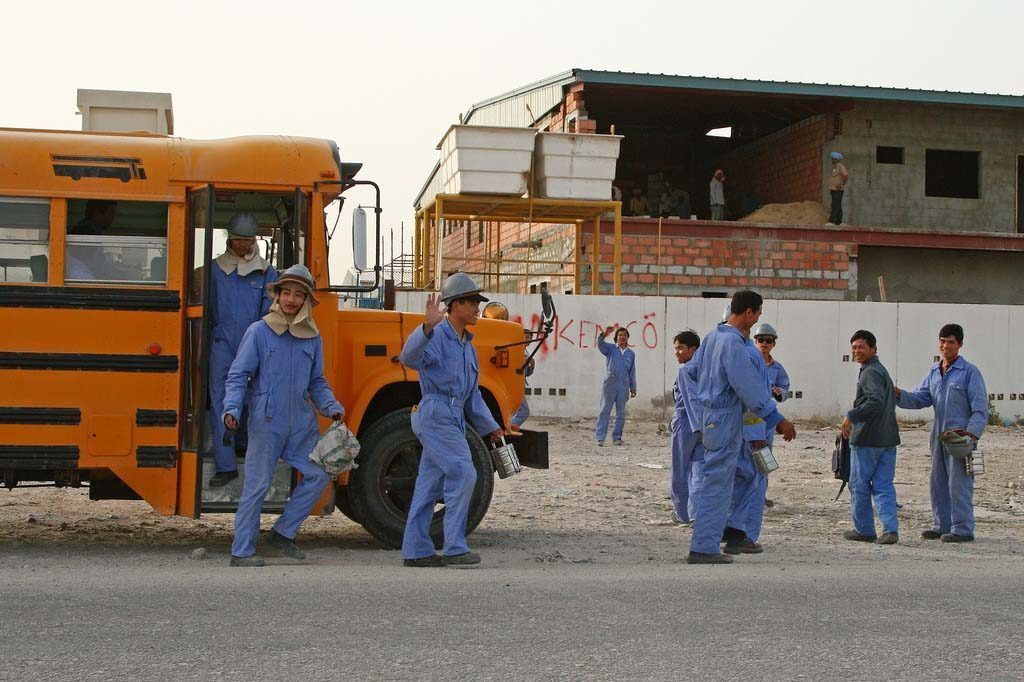Per regulations, workers are not allowed to work in outdoor spaces between 10:00 AM and 3:30 PM from 1 June to 15 September.
Qatar’s regulations to protect workers over the last two years have significantly reduced the number of injuries caused by occupational heat stress, according to officials.
In May 2021, Qatar introduced a law to prevent work in outdoor spaces between 10:00 AM and 3:30 PM from 1 June to 15 September to avoid the summer heat.
This replaced previous 2007 legislation that prohibited work in outdoor workspaces from 11:30 AM to 3:00 PM, between 15 June and 31 August. The decision also entailed various safety measures for companies to ensure safety of workers.
Since then, authorities have continued to carry out awareness campaigns on the dangers of heat stress during working hours to prevent fatal injuries.
On Tuesday, Qatar’s Minister of Labour Dr. Ali bin Smaikh Al Marri emphasised Doha’s commitment to updating heat stress prevention regulations in line with changes in the labour market.
“Qatar leads the way in safeguarding workers from the negative impacts of occupational heat stress. The country was one of the first in the world to implement a comprehensive plan aimed at reducing the detrimental effects of high temperatures on workplace productivity,” the minister said during the International Conference on Occupational Heat Stress.
Al Marri explained that the ministry had extended the ban on working in open places during the summer, resulting in a higher number of prohibited working hours compared to other countries in the region.
He also highlighted that the labour ministry has implemented several measures to enforce legislation, including awareness campaigns and worksite inspections for employers and employees.
The conference, held in collaboration with the International Labour Organization, aims to discuss new measures, challenges, and opportunities for adopting progressive approaches to mitigate the impact of heat stress on the workplace.
It also looks to align with global and regional trends in addressing this issue.
In recent years, Qatar has also collaborated with international partners to carry out the largest study on the effects of occupational heat stress, starting in 2019.
“The study’s findings have contributed to the global understanding of occupational heat stress and provided insights into potential solutions. As a result, the study has made recommendations aimed at improving worker protection,” he added.
Climate change is a global crisis that has affected the world, including the challenges related to global warming and its impact on the workplace, he added.
For that reason, organising meetings to discuss ways to mitigate the impact of high temperatures on the work environment, which is a priority for the occupational safety and health policy, is essential.
The minister also emphasised the ministry’s continuous collaboration with regional and international partners to improve prevention measures and increase the capacity to monitor heat stress cases.
In addition, Khalifa Khamis Mattar Al Kaabi, a Representative of the Federation of Chambers of Commerce and Industry in the UAE and a member of the International Labour Organization Governing Body for West Asian countries, confirmed that employers are fully committed to occupational safety and health.
He stressed the importance of taking appropriate measures to prevent accidents and injuries and protect workers.
“Safeguarding the well-being and safety of workers is not solely a moral or legal responsibility but also an essential requirement for achieving sustainable economic growth within countries. It is also crucial for countries that supply a significant portion of the workforce in other nations”, he noted.
Dangers of heat stress
Heat stress is a serious occupational health concern, particularly in hot countries like Qatar.
When the body is exposed to high temperatures and humidity levels, it can become unable to regulate its internal temperature, leading to heat-related illnesses.
These can range from mild symptoms such as cramps and exhaustion to more severe conditions like heat stroke, which can be fatal.
Additionally, workers who suffer from heat stress are also at an increased risk of accidents and injuries, as their ability to concentrate and react quickly may be impaired.
According to Dr. Ruba Jaradat, the Assistant Director-General and Regional Director for the Arab States at the ILO, the increase in global temperatures poses challenges that could lead to a rise in occupational illnesses. This, in turn, could have negative effects on workers in both the short and long term.
Authorities have taken on measures to prevent and manage heat stress in the workplace, such as providing adequate ventilation and hydration, rest breaks, and training for workers and supervisors on how to identify and respond to heat stress symptoms.







